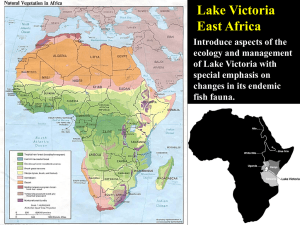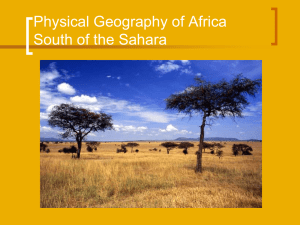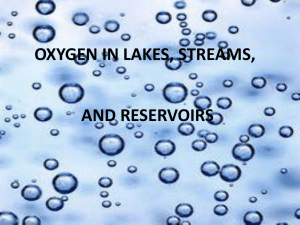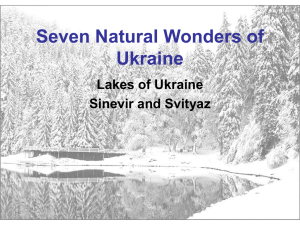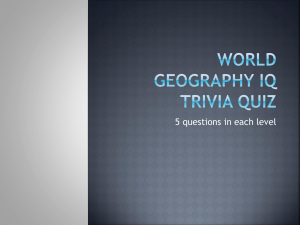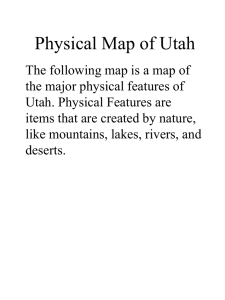13.Prof_. Mbuthia- VicRes Scientific MEETING
advertisement
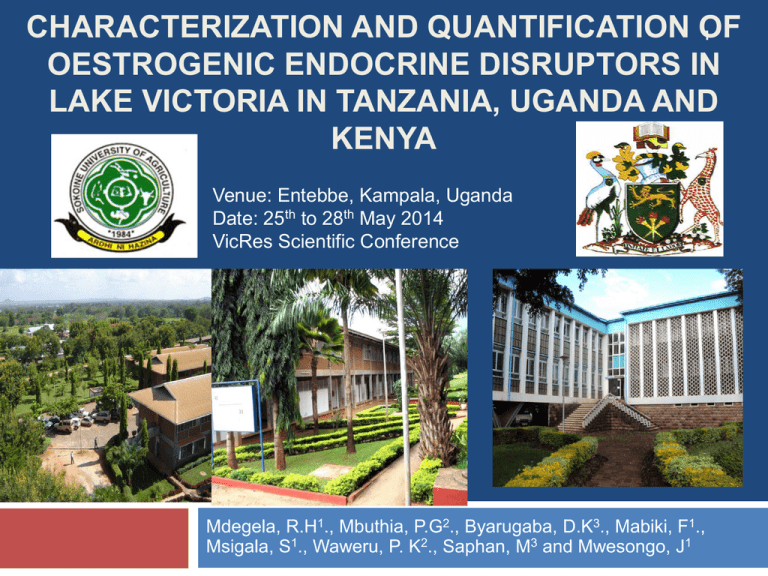
CHARACTERIZATION AND QUANTIFICATION OF 1 OESTROGENIC ENDOCRINE DISRUPTORS IN LAKE VICTORIA IN TANZANIA, UGANDA AND KENYA Venue: Entebbe, Kampala, Uganda Date: 25th to 28th May 2014 VicRes Scientific Conference Mdegela, R.H1., Mbuthia, P.G2., Byarugaba, D.K3., Mabiki, F1., Msigala, S1., Waweru, P. K2., Saphan, M3 and Mwesongo, J1 LAKE VICTORIA 2 Sub-optimal productivity of fish in Lake Victoria • Climate challenge – global warming • Overfishing • Diseases – Infectious and non-infectious • • Pollution - Point and non-point sources THREATS FROM POLLUTION 3 Increased human population Unplanned (informal) settlements Poor management of wastes Direct disposal of wastes in water bodies (Rivers & Lake) POLLUTANTS OF CONCERN 4 Conventional group of pollutants and challenges Pesticides Heavy metals Emerging group of pollutants and challenges Endocrine disruptors Pharmaceuticals Justification 5 Exposure of fish to oestrogenic endocrine disruptors: Alter normal functions of natural hormones responsible for critical physiological processes A challenge of great concern worldwide Many Developed countries, have determined: Sources, concentrations, identities, Health effects in aquatic & terrestrial animals In developing countries, such studies are limited Environmentally Important Oestrogens 6 Oestrogenic hormones include: 17 β -estradiol – β E2 17α-estradiol – α E2 Estriol - E3 Estrone - E1 Mestranol - M 17α-ethynylestradiol – EE Important characteristics Low water solubility Associated with suspended solids Aim of the study 7 To detect and quantify selected oestrogenic endocrine disruptors in water in Lake Victoria in view to assess their contribution to health status of fish STUDY AREA: LAKE VICTORIA, MWANZA GULF 8 Maganga beach, Nyashishi River, Butimba River, Nyakurunduma River, Mirongo River, Old Igombe Landing site, Butuja, Shede and Kigongo Ferry (9 sites) Lake Victoria, Napoleon Gulf, Jinja, Uganda Rwebitookeisland, Bidico, Wairaka, wanyange, Masese, kakira, wanyange drainage, kirinya-fish industry, kirinya–leatherindustry, NWSC, and area with no human activity (11 site) 9 Figure 1: Lake Victoria, Winam Gulf, Kenya Railway sewage, Tilapia beach, Dunga, Rivers: Kisat, Luanda, Otiako, Nyamasaria, Tako, Wigwa, Auji & Kibos (11 sites) •Homabay landing site, Rivers: Awach, Nyakwanya, Arujo (4 10 sites) Collection of water samples 11 Three water samples were collected from each of the sampling points that included Inshore Intermediate point 1(00 meters from inshore) Offshore (500 meters from the inshore) Rivers (100M before entry into lake) At entry point into the lake At 500 meters from the river entry points Collection of water samples (cont……) 12 Water samples were collected in clean 2.5 liter glass bottles Extractions done within 12-24 hours after collection Fish samples 13 Mwanza: Live Tilapia fish were fished where all the water sampling points converged. In Jinja (Live 44 Tilapia), Kisumu and Homabay (71 Tilapia and 52 Nile perch) live fish samples were caught from the selected water sampling sites and others purchased from fishermen at the landing sites. Each fish sampled was examined for gross and histopathological lesions externally and internally. Extraction of pollutants in water 14 Extraction of water samples carried out according to Swart and Pool (2007) with minor modifications Detection and quantification 15 The detection and quantification used Estrogen (El/E2/EE) ELISA KIT Competitive ELISA technique as per manufacturers recommendations Total oestrogens (E1, E2 and EE) Estrone(E1), 17-β Estradiol (E2) Ethynylestradiol (EE) Results: Validation of the Assay 1.4 1.6 1.4 1.2 1 0.8 0.6 0.4 0.2 0 y = -0.3446x + 1.7173 R² = 0.9314 Absorbance (450 nm) Absorbance (450 nm) 16 1.2 y = -0.2825x + 1.4855 R² = 0.9856 1 0.8 0.6 0.4 0.2 0 0 0.016 0.16 1.6 (a) Concentration of total oestrogens in water extract from a sewage pond effluent (pg/L) 0 0.05 0.15 0.5 3 (b) Concentration of total oestrogens in standards (µg/L) Degree of agreement of the two established correlation coefficients was 94.5% Results: Total estrogenic EDs (mean ± SD) concentration (pg/L) in water at different sites 17 Rivers at entry a Rivers before entry b Off shore Intermediate Inshore a a a 50 100 150 200 Concentration of total oestrogens (pg/L) 18 Results: Total estrogens concentration (ng/L) in Homabay, Kenya Results: Total oestrogens, Estrone and Estradiol (ng/L) in water from different sites 19 Beach offshore Beach intermediate Beach landing site E2 E1 Total Rivers offshore Rivers entry point Rivers before 0 500 1000 1500 Concentration (ng/L) 2000 3.5 Concentration of estrogens (μg/L) 3 2.5 2 Conc. Total Es Conc. E1 1.5 Conc. E2 Conc. EE2 1 0.5 0 0m 20 100m 500m C3/1 Site of sample collection C3/2 C3/3 Results: Comparison of estrogens levels (μg/L) in Napoleon Gulf and selected waste water sites in Kampala Uganda Summarized Eds Results 21 Mwanza Gulf: 1. Total oestrogens - 0.39 – 38.9 ng/L 2. Estrone (E1) - 0.37 – 6.36 ng/L 3. 17-β Estradiol (E2) - 0.0021 – 0.12 ng/L 4. Ethynylestradiol (EE) - 0.0026 – 0.032 ng/L Summarized Eds Results 22 1. 2. 3. 4. Napoleon Gulf Total oestrogen -200 800 ng/L Estrone (E1) - 9.8 - 49 ng/L 17-β Estradiol (E2)- 145 - 305 ng/L Ethynylestradiol (EE) 45 - 360 ng/L Kisumu Total Estrogen - 0.57 – 64.21 ng/L 1. Homabay – Total Estrogen - 0.35 – 3.63ng/L 1. Gross Abnormalities in Fish 1. Missing tail/fins - 18.3 % 2. Missing eye/opacity - 17.3 3. Deformed body - 11.5 4. Deformed head (jaw, face) heart - 8.7 5. Kinked back and tail - 6.7 6. Abnormal body color - 3.8 7. Growth on back - 3.8 8. Operculum absent - 2.9 9. Missing scales - 1.9 10. Dropsy - 1.0 11.Splenic granulomas/ increased MM 12.Cystic formation in gonads - 2.4 23 13.Aspermia, cystic and atretic gonads Dorsal fin starting from the middle of the back 24 25 26 Prevalence of lesions in gonads 27 Prevalence of lesions in gonads 28 Cysts embedded in the testicular parenchyma: 2.4% Loosely attached fluid filled cysts: 1.2% Histopathological Lesions 29 Discussion/Conclusions 30 All water samples analyzed were positive for total, E1, E2 and EE oestrogenic endocrine disruptors Some areas had low concentrations, similar finding to other studies (Campbell et al., 2006) Although low, their potential impact on fish health must be considered Discussion/conclusions 31 In all countries highest estrogens concentration were detected in rivers 100 meters before and at entry point into the lake, fish landing sites and water from sewage treatment plants. Significant difference (P<0.05) was observed for estrogens levels in river water samples and different lake sampling points. This study shows existence of oestrogen EDs at different concentrations, and rivers are the main sources of pollutants into Lake Victoria. Conclusions/recommendations 32 Findings from this study therefore calls for intervention that would minimize the discharge of domestic waste water into the rivers and eventually into the lake Measures for treatment of polluted water before being discharged into the lake should be among target strategic points Conclusions/recommendations 33 Oestrogenic pollutants be considered among emerging pollutants in developing countries Further studies Profiling of oestrogenic pollutants Effect studies of oestrogenic endocrine disruptors in fish ACKNOWLEDGEMENTs 34 SIDA – VICRES PROJECT IUCEA UNIVERSITY OF NAIROBI SOKOINE UNIVERSITY AGRICULTURE MAKERERE UNIVERSITY ALL LAKE VICTORIA – FISHERIES STAKEHOLDERS THANK YOU FOR LISTENING & SUPPORT 35
